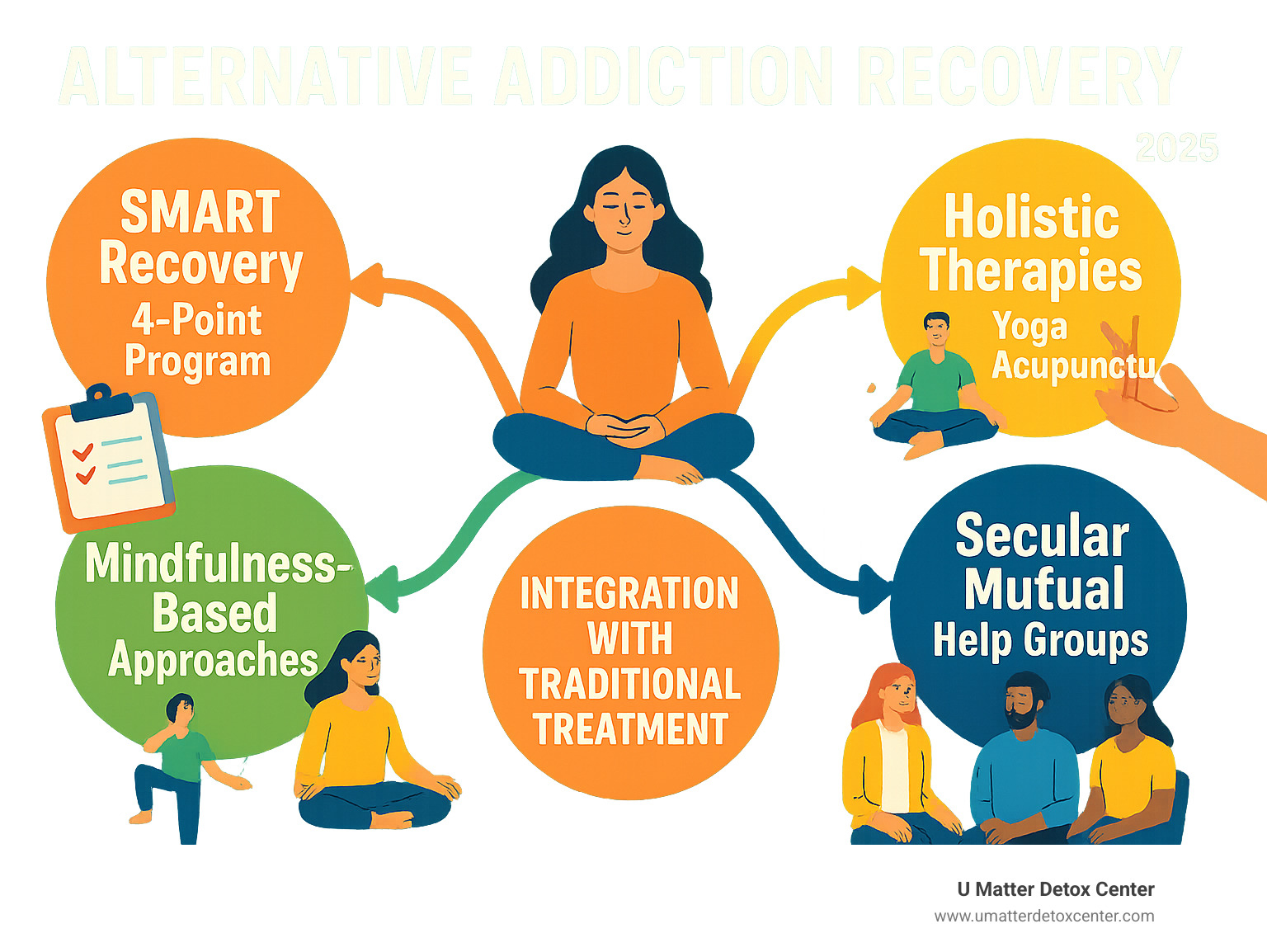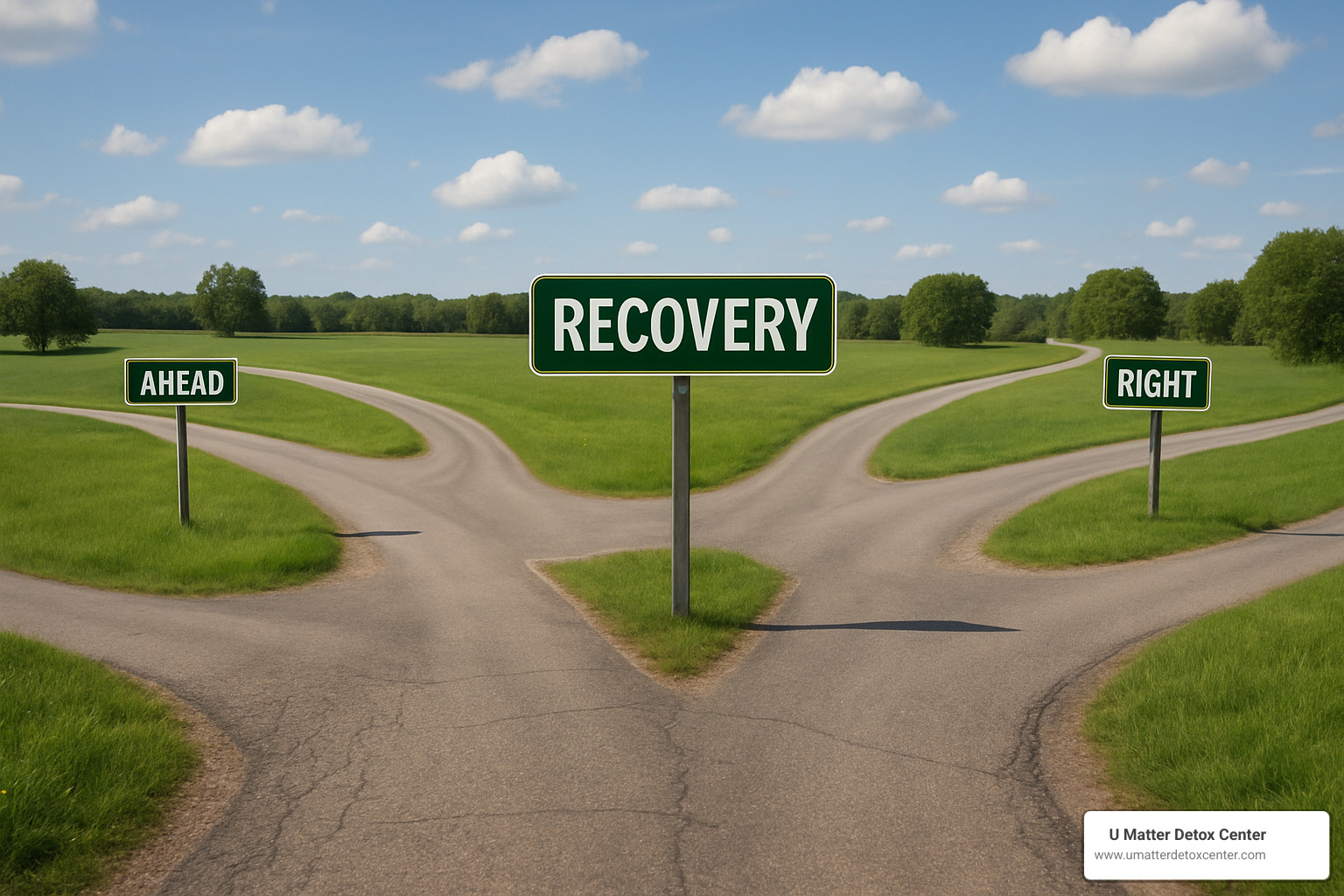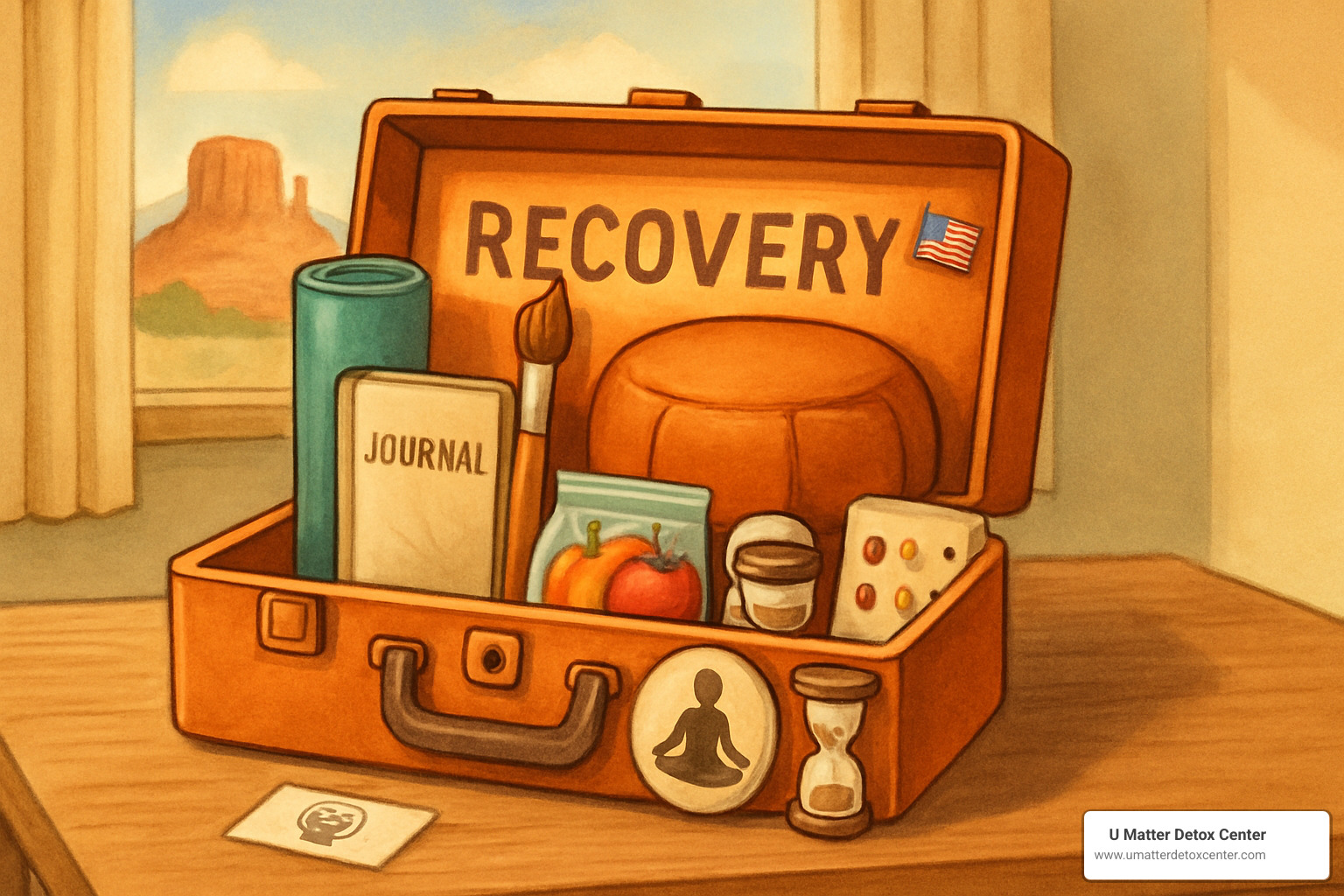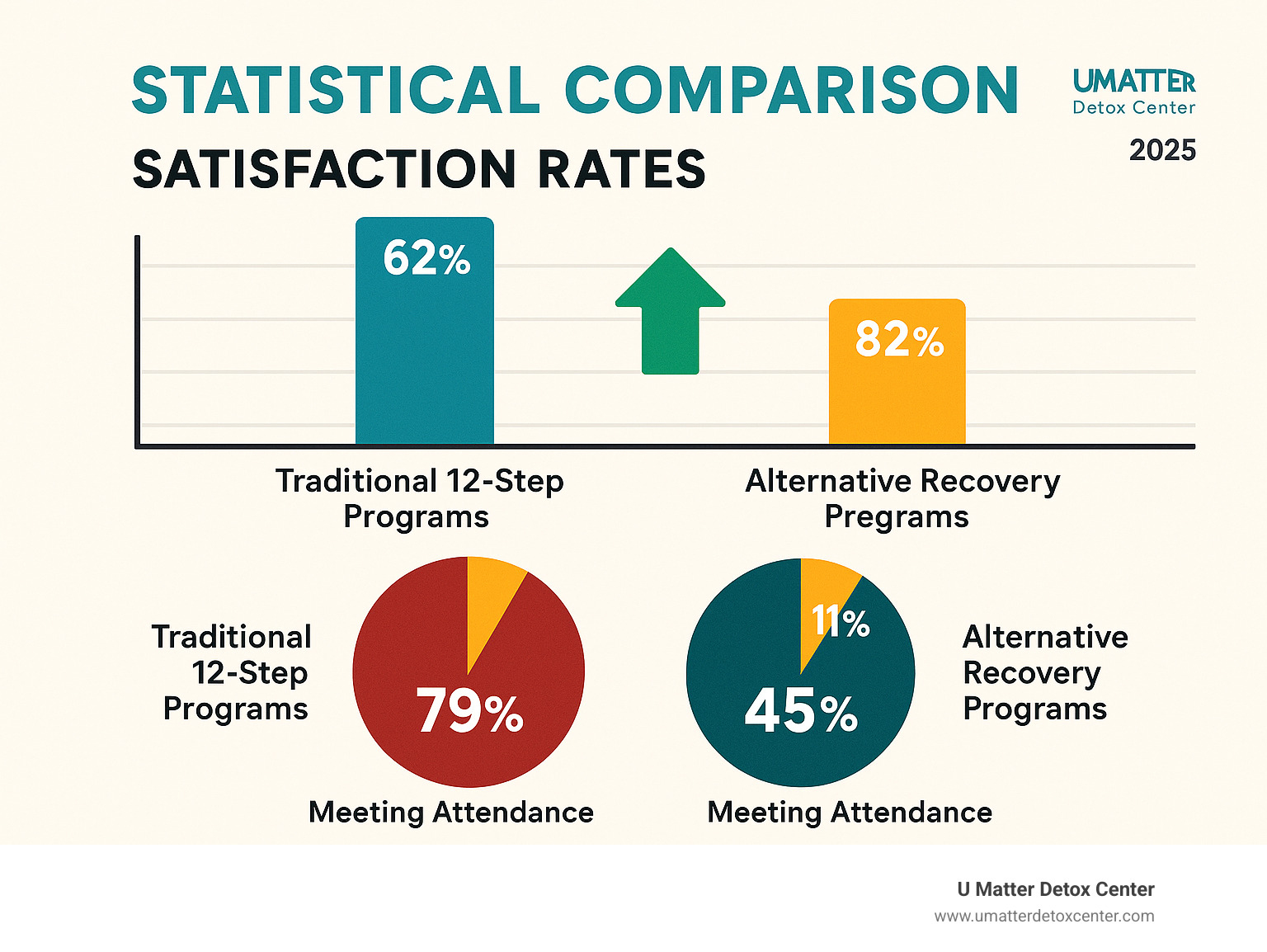Why Alternative Addiction Recovery Is Changing Modern Treatment
Alternative addiction recovery offers science-based, holistic approaches that go beyond traditional 12-step programs. These methods focus on self-empowerment, evidence-based therapies, and whole-person healing rather than spiritual surrender or disease models.
Quick Overview: Top Alternative Recovery Options
- SMART Recovery: Cognitive-behavioral tools and 4-point self-management program
- Mindfulness-Based Relapse Prevention (MBRP): 8-week meditation and coping skills training
- Refuge Recovery: Buddhist-inspired, non-theistic community support
- Holistic Therapies: Yoga, acupuncture, art therapy, biofeedback, and nutrition counseling
- Women for Sobriety: Gender-specific empowerment and 13 acceptance statements
- LifeRing Secular Recovery: Self-directed, non-religious peer support groups
Recovery from addiction is deeply personal. What works for one person may not work for another. While 12-step programs like Alcoholics Anonymous have helped millions worldwide, they're not the only path forward.
Research shows that 34% of people who overcame alcohol problems attended mutual help groups alternative to 12-step programs. Members of these alternatives reported higher levels of satisfaction and group cohesion despite attending fewer in-person meetings.
For high-achieving professionals seeking discreet, evidence-based treatment, alternative approaches offer flexibility without judgment. They emphasize personal empowerment over powerlessness, scientific methods over spiritual doctrine, and individualized care over one-size-fits-all solutions.
These programs work especially well for people who:
- Prefer secular, non-religious approaches
- Want cognitive-behavioral tools and practical strategies
- Need privacy and flexibility in their recovery journey
- Have co-occurring mental health conditions
- Didn't find success with traditional 12-step models

Handy alternative addiction recovery terms: - addiction recovery retreat - holistic detox center
The Search for New Paths
We understand that recovery isn't just about stopping substance use - it's about rebuilding your entire life. Traditional approaches often focus on surrendering control, but alternative addiction recovery emphasizes taking charge of your healing journey.
Many of our clients come to us after feeling disconnected from conventional programs. They're looking for approaches that honor their intelligence, respect their autonomy, and provide practical tools they can use in real-world situations.
How This Guide Works
Throughout this guide, we'll share evidence-based insights from recent research and our clinical experience. You'll find practical steps you can take immediately, whether you're just starting your recovery journey or looking to strengthen your existing foundation.
Why Look Beyond the 12 Steps?

Standing at a crossroads in your recovery journey can feel overwhelming. You might have tried 12-step programs and found they didn't quite fit, or perhaps you're looking for something that aligns better with your personal beliefs and values.
While 12-step programs have genuinely helped millions of people worldwide, they're built on a foundation that doesn't resonate with everyone. About 60% of public treatment programs in the U.S. rely heavily on the 12-step model, yet many people find themselves struggling with core concepts like admitting powerlessness or relying on a higher power for recovery.
Dropout rates from traditional programs remain high - not because people don't want recovery, but because the approach may not match their learning style, personal beliefs, or life circumstances.
Core Challenges of 12-Step Models
The spiritual language woven throughout 12-step programs can feel alienating if you prefer secular approaches to healing. Phrases like "turning your will and life over to God" or accepting complete powerlessness over addiction can conflict with your values around personal responsibility and self-determination.
When you're someone who believes in taking charge of your life and making informed decisions, being told you're powerless can feel counterintuitive. Many of our clients describe feeling frustrated by this concept, especially high-achieving professionals who've built their lives around problem-solving and personal agency.
Mandated attendance creates another significant barrier. Court-ordered participation in 12-step meetings has actually raised First Amendment concerns in some cases, leading to legal requirements that secular alternatives be offered.
Who Seeks Alternatives?
The research reveals clear patterns in who gravitates toward alternative addiction recovery options. Non-religious adults make up a significant portion of people seeking alternatives, along with women who often prefer approaches that address gender-specific challenges.
People with dual-diagnosis conditions frequently find that traditional programs don't adequately address their complex needs. Higher-educated individuals tend to seek evidence-based treatments they can understand and evaluate for themselves.
What the Evidence Shows
A comprehensive national study found that members of alternative mutual help groups reported equivalent or higher levels of satisfaction and group cohesion compared to 12-step participants, despite attending fewer in-person meetings.
Long-term outcomes demonstrate that multiple pathways can lead to sustained recovery. The key insight isn't about finding the "best" program - it's about finding the right fit for your unique personality, beliefs, circumstances, and goals.
Meet the Major Alternative Mutual-Help Programs
When it comes to alternative addiction recovery, you have more options than you might realize. These programs offer fresh perspectives that go beyond traditional approaches, each bringing something unique to the table.
Unlike the spiritual foundation of 12-step programs, these alternatives focus on different core principles. Some emphasize self-empowerment and scientific methods, while others create secular community support or address specific populations like women.
SMART Recovery leads with practical cognitive-behavioral tools. Refuge Recovery brings mindfulness and Buddhist-inspired wisdom without requiring religious conversion. LifeRing keeps things secular and peer-led, while Women for Sobriety addresses the unique challenges women face in recovery.
Most of these programs offer both online and in-person meetings, making them accessible whether you're juggling a demanding career or living somewhere with limited local options.
| Feature | 12-Step Programs | Alternative Programs |
|---|---|---|
| Spiritual Component | Required higher power belief | Optional or secular approaches |
| Personal Agency | Emphasizes powerlessness | Focuses on self-empowerment |
| Meeting Structure | Standardized format | Flexible, varied approaches |
| Graduation Concept | Lifelong participation | Some allow "graduation" |
| Evidence Base | Traditional/experiential | Often research-backed |
SMART Recovery vs 12-Step: an alternative addiction recovery roadmap
SMART Recovery flips the script on traditional thinking about addiction. Instead of admitting powerlessness, this program teaches that you absolutely have the power to change your life through practical tools and smart strategies.
The name says it all: Self-Management and Recovery Training. Built on solid cognitive-behavioral therapy principles, SMART Recovery gives you a toolkit that actually works in real-world situations.
Their 4-Point Program creates a clear roadmap. Building and Maintaining Motivation helps you use cost-benefit analysis and goal-setting. Coping with Urges and Cravings teaches practical techniques like distraction and urge surfing. Managing Thoughts, Feelings, and Behaviors focuses on identifying triggers and developing rational responses. Living a Balanced Life helps you create meaningful activities and relationships.
SMART Recovery meetings feel refreshingly different. Instead of sitting in a circle sharing stories, you're actively working through tools together, tackling current challenges, and problem-solving as a group.
Here's something unique: you can actually "graduate" from SMART Recovery once you've developed sufficient self-management skills, giving you a clear sense of progress and achievement.
Refuge Recovery: Mindful Community Support
Refuge Recovery offers something beautifully different: a Buddhist-inspired path that doesn't require you to convert to any religion or adopt beliefs that don't fit your worldview.
This program applies ancient Buddhist wisdom - the Four Noble Truths and Eightfold Path - to modern addiction recovery. It frames addiction as repetitive craving for present-moment escape.
The approach is non-theistic, meaning there's no worship of deities or supernatural beliefs required. Instead, you'll learn practical meditation techniques, find community support, and personally investigate the causes and conditions that fuel your addictive behaviors.
Secular & Women-Centered Options
LifeRing Secular Recovery operates on a refreshingly simple principle: you are the expert on your own recovery. Their motto, "We are here to help ourselves and each other," perfectly captures their peer-led, non-prescriptive approach.
LifeRing meetings focus on the here-and-now rather than dwelling on past trauma. Participants share current challenges and successes, offering practical support without judgment.
Women for Sobriety recognizes that women face unique challenges in recovery, including trauma, relationship issues, and societal pressures. This program's 13 Acceptance Statements provide a framework specifically designed for building self-esteem and personal empowerment.
The approach emphasizes positive thinking, self-reliance, and celebrating your personal achievements - no matter how small they might seem.
Complementary & Mind-Body Therapies in Alternative Addiction Recovery
Beyond mutual-help programs, alternative addiction recovery includes a rich array of complementary and mind-body therapies. These approaches recognize that addiction affects the whole person - body, mind, emotions, and spirit - and healing must address all these dimensions.
Research shows that complementary approaches can significantly improve traditional treatment when used appropriately. A 2011 review found that mindfulness training increases self-regulation and decreases emotional reactivity, both crucial factors in preventing relapse.
At U Matter Detox Center, we've seen remarkable results combining Alternative Detox Methods That Actually Make Sense with conventional medical care. Our clients often find that yoga helps them reconnect with their bodies, art therapy provides emotional expression, and acupuncture reduces cravings and anxiety.
Mindfulness-Based Relapse Prevention: science meets alternative addiction recovery
Mindfulness-Based Relapse Prevention (MBRP) represents one of the most well-researched alternative approaches. This 8-week program combines mindfulness meditation with cognitive relapse prevention skills, teaching participants to observe cravings and emotions without automatically reacting.
The program's effectiveness lies in its ability to change the relationship between thoughts, feelings, and behaviors. Instead of fighting cravings or trying to make them disappear, participants learn to notice them with curiosity and compassion, allowing them to pass naturally.
MBRP sessions include guided meditations, mindful movement, and group discussions. Participants practice techniques like the SOBER breathing space (Stop, Observe, Breathe, Expand, Respond) and urge surfing, which treats cravings like ocean waves that rise and fall naturally.
Research demonstrates that MBRP participants show significant improvements in self-regulation, emotional reactivity, and relapse rates compared to standard treatment alone.
Holistic Modalities That Work
Nutrition counseling addresses the physical damage that addiction inflicts on the body. Substance use often leads to malnutrition, blood sugar instability, and neurotransmitter imbalances. Proper nutrition supports brain healing and stabilizes mood.
Massage therapy helps regulate the nervous system, which often becomes dysregulated during active addiction. Regular massage can reduce anxiety, improve sleep, and help people reconnect with their bodies in healthy ways.
Our Escape the Chaos with These Blissful Holistic Detox Retreats incorporate many of these modalities in beautiful, healing environments that support deep change.
Art therapy provides a non-verbal outlet for emotions that may be difficult to express in words. Many people find that painting, sculpting, or music-making helps them process trauma and connect with parts of themselves that addiction had buried.
Equine therapy offers unique opportunities for healing through interaction with horses. These sensitive animals respond to human emotions and energy, providing immediate feedback about emotional states and interpersonal patterns.
Biofeedback and neurofeedback use technology to help people learn to regulate their nervous systems consciously. These approaches can be particularly helpful for people with trauma histories or anxiety disorders that complicate recovery.
Safety, Research & Integration
While complementary therapies offer significant benefits, they're not without risks or limitations. The research on complementary approaches varies in quality and quantity. We always recommend working with qualified practitioners and maintaining open communication with your healthcare team.
Integration is key. These therapies work best as part of a comprehensive treatment plan that includes appropriate medical care, counseling, and social support.
Building Your Personal Recovery Mix

Think of building your alternative addiction recovery plan like putting together a personal toolkit. Just as you wouldn't use the same wrench for every job around the house, your recovery needs different tools for different situations and stages of healing.
Your recovery mix will be uniquely yours. What helps your friend stay sober might not click with you at all - and that's perfectly normal. The beauty of alternative approaches is that they give you permission to create something that actually fits your life, personality, and beliefs.
Start by thinking about where you are right now. If you're just starting to think about making changes, you might benefit from SMART Recovery's cost-benefit exercises. If you're already committed to change but struggling with cravings, mindfulness-based approaches might give you the tools to ride out those difficult moments.
Your values matter more than you might think. If you're drawn to ancient wisdom but don't connect with traditional religion, Refuge Recovery's Buddhist-inspired approach could feel like coming home. If you love understanding the science behind everything, SMART Recovery might speak your language.
Choosing the Right Fit
Finding the right recovery approach is like dating - you need to get to know what you're looking for before you can recognize it. Do you prefer spiritual, secular, or science-based approaches? There's no right answer, only what feels authentic to you.
Some people thrive in group settings where they can share experiences and learn from others. Others feel more comfortable working one-on-one with a therapist. Are you energized by group discussions, or do you prefer quieter, more reflective activities?
Think about how you learn best. Do you like structured exercises with clear steps, or do you prefer exploring ideas through conversation? Some people love the practical tools of SMART Recovery, while others connect better with the contemplative approach of Refuge Recovery.
Your recovery goals matter too. Are you aiming for complete abstinence, harm reduction, or moderation? Different programs have different philosophies about what success looks like.
If you have anxiety, depression, or trauma alongside addiction, you'll need approaches that can handle both issues together. Some programs are better equipped for complex mental health needs than others.
Combining Traditional & Alternative Paths
Here's something that might surprise you: you don't have to choose just one approach. Many people create powerful recovery plans by combining traditional and alternative methods in ways that make sense for their lives.
You might attend SMART Recovery meetings while also receiving medication-assisted treatment from your doctor. Or you could participate in traditional outpatient counseling while adding yoga and meditation to your weekly routine.
Medication-assisted treatment (MAT) compatibility is worth considering carefully. Programs like SMART Recovery explicitly welcome people who use prescribed medications like methadone, buprenorphine, or naltrexone.
Working with a therapist who understands and supports complementary approaches can make a huge difference. Look for someone who sees addiction as complex and multifaceted, not just a matter of willpower or moral failing.
Finding Programs & Support
The internet has revolutionized access to alternative recovery support. Online meetings are now available 24 hours a day through programs like SMART Recovery, making support accessible whether you're dealing with insomnia at 3 AM or need a midday boost during a stressful workday.
Virtual meetings can be especially valuable if you live in a rural area with limited local options, need to maintain privacy, or have mobility challenges.
Don't assume your local area doesn't have alternative programs just because they're not widely advertised. Call treatment centers and ask about their program offerings. Many facilities now incorporate mindfulness, yoga, art therapy, or other complementary approaches into their standard programming.
SAMHSA's Behavioral Services Locator is an excellent free resource for finding treatment options in your area. You can search specifically for programs that offer alternative approaches or complementary therapies.
If you're curious about what comprehensive alternative treatment looks like in practice, our guide on What to Expect at a Holistic Detox Center: Therapies, Benefits, and Results walks you through the entire experience from start to finish.

Frequently Asked Questions about Alternative Addiction Recovery
Is abstinence always required in alternative programs?
The short answer is no - and that's one of the beautiful things about alternative addiction recovery approaches. They recognize that people have different relationships with substances and varying recovery goals.
Moderation Management takes a harm reduction approach, helping people who want to reduce problematic drinking without necessarily stopping completely. SMART Recovery supports whatever recovery goals make sense for each individual, though they're honest that abstinence is typically the most successful long-term strategy for people with severe addiction.
Refuge Recovery emphasizes abstinence as part of Buddhist ethical principles, viewing substance use as a form of suffering that prevents spiritual growth. LifeRing welcomes people with various recovery goals, focusing on peer support regardless of your specific approach.
Here's the reality we see at our center: while moderation works for some people with mild to moderate problems, those with severe addiction typically need complete abstinence to achieve stable recovery. Your safety and long-term wellness should always come first.
Can I use alternative therapies alongside medication-assisted treatment?
Absolutely, and we encourage it! Most alternative addiction recovery approaches not only work well with medication-assisted treatment (MAT) but can actually improve your overall treatment experience.
SMART Recovery explicitly supports the use of prescribed medications, recognizing that addiction is a medical condition that often requires medical treatment. Their evidence-based approach aligns perfectly with the scientific foundation of MAT.
Mindfulness-based approaches can be incredibly helpful when you're on medications like methadone, buprenorphine, or naltrexone. They help you manage any side effects, develop a healthier relationship with medical treatment, and build coping skills that support your recovery.
Yoga and other movement therapies support your overall health while you're on MAT. They can help with energy levels, mood, and physical well-being. Acupuncture may help with lingering withdrawal symptoms and cravings that sometimes persist even with medication support.
The key is communication. Always let your healthcare providers know about any complementary therapies you're considering. At U Matter Detox Center, we coordinate closely with medical providers to ensure all treatments work together safely and effectively.
How do online meetings compare to in-person for support and outcomes?
Online meetings have revolutionized access to alternative addiction recovery support, and the results are genuinely encouraging. Research suggests that online participation can be as effective as in-person meetings for many people, especially when combined with other support systems.
The accessibility factor is huge. SMART Recovery offers online meetings 24 hours a day, which means you can find support whenever you need it. Whether you're dealing with a craving at 2 AM or need connection during your lunch break, there's likely a meeting available.
The anonymity aspect appeals to many people, particularly professionals who need discretion in their recovery journey. You can participate from the privacy of your home, which removes barriers that might prevent some people from seeking help.
But let's be honest about what you might miss online. In-person meetings offer immediate human connection, the ability to read body language and nonverbal cues, and opportunities for informal support before and after meetings.
The sweet spot for many people is combining both formats. You might attend your primary meetings online for consistency, then join in-person meetings when possible for deeper connection. What matters most is finding consistent support that fits your lifestyle and keeps you engaged in your recovery journey.
Conclusion
Your journey toward alternative addiction recovery doesn't end here - it's just beginning. The landscape of recovery has expanded far beyond traditional models, offering genuine hope for people who need different approaches or simply want more choices in their healing process.
The evidence speaks for itself: people using alternative programs report higher satisfaction rates and stronger group connections, even when attending fewer meetings. This isn't about finding the "perfect" program - it's about finding what genuinely resonates with your values, learning style, and life circumstances.
Maybe you're drawn to SMART Recovery's practical cognitive tools that put you in the driver's seat of your recovery. Perhaps Refuge Recovery's mindful approach offers the peace and community you've been seeking. Or you might find that holistic therapies like yoga, acupuncture, and nutrition counseling provide the whole-person healing your body and mind need.
The beauty of alternative approaches lies in their flexibility. You can combine mindfulness-based relapse prevention with traditional therapy. You can attend LifeRing meetings while receiving medication-assisted treatment. You can create your own personalized roadmap that honors both your recovery goals and your individual preferences.
At U Matter Detox Center, we've witnessed countless clients find their authentic path to sustained wellness. Our luxury facilities across Los Angeles County provide the perfect environment to explore these alternatives safely and thoroughly. We understand that recovery isn't one-size-fits-all, and we're committed to helping you find what actually works for your unique situation.
Your recovery journey belongs to you alone. It doesn't have to look like anyone else's story or follow someone else's timeline. The combination of evidence-based methods, genuine peer support, and holistic healing creates a foundation strong enough to support lasting change.
Recovery is absolutely possible, and it can happen on your terms. Whether you're just starting to explore alternatives or you're ready to dive deep into a comprehensive program, the resources and support you need are available.
Take that first step toward finding your personal path to healing. Explore the programs we've discussed, connect with communities that speak to your heart, and remember that asking for help is a sign of strength, not weakness.
Your journey to sustained wellness starts with believing that you deserve an approach that truly fits who you are. Learn more about how we can support your unique path at What to Expect at a Holistic Detox Center: Therapies, Benefits, and Results.


